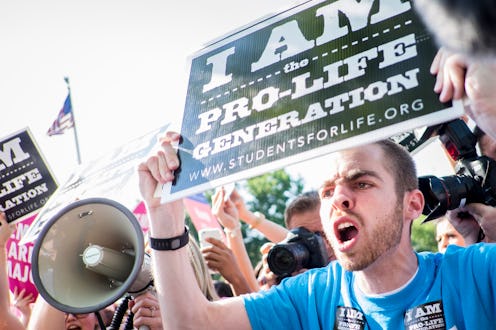News
How Republicans Defined The Abortion Debate For Our Generation

Earlier this month, the top ranking Democrat in the House of Representatives, Nancy Pelosi, said abortion was "fading as an issue" for voters in her party. The comment came shortly after Vermont Sen. Bernie Sanders campaigned for Heath Mello, a Democratic candidate for mayor of Omaha who supported legislation that some reproductive rights advocates had criticized as anti-choice. Rep. Tim Ryan, a rising leader in the party, also voiced concerns that Democrats were treating abortion access as a red-line issue: "Requiring everybody to fit some purity test is a recipe for disaster," he told the Associated Press.
However, Pelossi's comments — as well as her Democratic colleagues — rankled some party members and at least puzzled many others. Pelosi's spokesperson Drew Hammill later clarified the House minority leader's comments, saying:
"In her conversation with the Washington Post today, Leader Pelosi discussed how the issue of abortion has 'faded' as an issue that divides Democrats given that the vast majority of Democrats in Congress are staunchly pro-choice. House Democrats recognize, while there are differences in the closest of families about deeply held personal beliefs, legislating those beliefs onto others is a complete non-starter."
But even as Pelosi's team tried to diffuse the comment, it was still clear that many pro-choice Democratic voters felt betrayed by their party. "Abortion access is not a side issue; it is a fundamental aspect of our liberty. If the Democratic Party wants to court white cis-male voters by abandoning abortion rights, they will be abandoning the backbone of the party," Lauren Rankin wrote in DAME.
Illyse Hogue, president of NARAL Pro-Choice America, wrote in a recent Facebook post that, "Of course the Democratic Party has room for those who identify as personally opposed to abortion. It always has and always will. However, the real question, and where we draw the line, is when candidates and elected leaders force their own ideology and religious values on their constituents and the women of this country."
When and how did Democrats become the party of the pro-choice movement? The relationship is so ubiquitous that many don't pause to consider the history.
Christina Greer, associate professor of political science at Fordham University, tells Bustle that the tie between Democrats and the pro-choice movement came as a response to the rise of the influence of religious fundamentalism on the right.
"That sort of pushed the Democratic party more and more to the left over time," Greer tells Bustle. "So nationally, Democrats became the party of progressive values, and Republicans became the party of traditional values, whatever that may be."
"It's whether or not Republicans believe that a woman should be able to make this decision on their own, without interference of the government or her husband or her father."
Greer says Roe v. Wade was a "catalytic moment" in American politics, becoming one of the biggest — at times, the biggest — social lightening rod dividing Democrats and Republicans.
Since this divide over abortion, Greer says that the Republicans' ability to market their stance as being pro-life has been "fantastic" for them. She points to how it has enabled the GOP to make the focus of the argument moral, rather than driven by health, women's rights or economics.
"The framing of the debate, it's set up as pro-choice versus pro-life, but it's actually not. The frame is pro-choice versus anti-choice," Greer says. "It's whether or not Republicans believe that a woman should be able to make this decision on their own, without interference of the government or her husband or her father."
Greer worries that nuances about how Americans feel about abortion and reproductive rights may be lost if Democrats do, in fact, make it a litmus test of sorts for the part.
"I think they need to be careful as a party to make a blanket statement that everyone in the party has to be this way," Greer says. "When you start painting with too broad of a brush, you miss opportunities to actually engage in conversation with other Democrats who may not agree with you on this one particular issue."